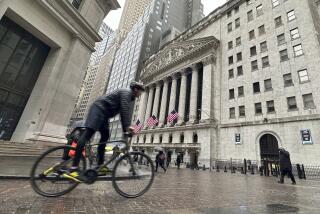Fed jumps in for Wall St. again
The Federal Reserve took another big step late Sunday to reshape Wall Street and end the era of goliath investment banks, even as Congressional Democrats worked to put their imprint on the Treasury Department’s unprecedented $700-billion plan to shore up the economy.
The Fed gave the green light for the two remaining major investment banks -- Goldman Sachs Group Inc. and Morgan Stanley -- to become bank holding companies that can create commercial banks to take federally insured deposits, make an array of loans and otherwise act like any other bank.
The change subjects the two companies, which already had limited banking powers, to much stricter federal regulation. But that may save them from the vagaries of Wall Street, and the risk that they could fall victim to the credit squeeze that has claimed two of their major rivals since March.
The new line of inexpensive funding -- bank deposits -- and lending powers could help the firms gain the stability and flexibility that have helped other major banking companies, such as JPMorgan Chase & Co., Bank of America Corp. and Wells Fargo & Co., withstand the turmoil in the financial system this year.
The banking charter also gives the companies permanent access to the Fed’s borrowing window, a privilege the central bank opened to investment banks in March, but only temporarily.
Meantime, Democrats were busy rolling out some of the details on changes they want to make in Treasury’s bailout plan, seeking to ensure that Main Street, not just Wall Street, receives help. Their moves set the stage for tough bargaining this week with the White House in the heat of a political campaign.
As Treasury Secretary Henry Paulson hopscotched the Sunday talk shows urging lawmakers to move swiftly, Democrats said they would push for changes that include increasing aid for homeowners at risk of foreclosure, limiting executive compensation at companies that benefit from the bailout and establishing tough oversight of the rescue plan.
“I won’t support a program that signs a $700-billion check and says ‘Come back someday when you’ve resolved the issue,’ ” Sen. Christopher Dodd (D-Conn.), chairman of the Senate Banking Committee, told reporters Sunday afternoon. “We all want to get this job done, but we want to get it done right.”
Appearing on four of the five Sunday shows, Paulson repeatedly portrayed the plan as necessary to stave off one of the nation’s worst economic calamities, but he is facing a tough job of selling it to some members of President Bush’s own Republican Party who are concerned about its staggering cost to taxpayers, as well as perceptions that it favors financial institutions over ordinary Americans.
“This is the mother of all bailouts,” Sen. Richard Shelby of Alabama, the top Republican on the Senate Banking Committee, said on CBS’ “Face the Nation.”
Rep. Barney Frank (D-Mass.), appearing on the same program, added: “It’s kind of hard to tell the average American that we’re going to continue to have foreclosures that destabilize neighborhoods and deprive cities of revenues they need, but we’re going to buy up the bad paper.”
But Paulson said that the plan would benefit everyone because of the significant ripple effects that occur when companies cannot borrow money. “It pains me tremendously to have the American taxpayer be put in this position, but it’s better than the alternative,” he told NBC’s “Meet the Press.”
The plan would give the Treasury secretary broad authority to buy the troubled mortgage-related assets of financial institutions in order to stabilize financial markets, and he predicted that the “ultimate cost” to taxpayers would be far less than the “headline number” of $700 billion. “Those assets will be held and will be sold,” Paulson told ABC.
He urged Congress to act this week, before Friday’s scheduled recess for the fall campaign.
Frank, chairman of the House Financial Services Committee, sent Paulson a counterproposal Sunday that is expected to be the subject of intense negotiations. According to a copy of the document, it calls for:
* Requiring companies that sell bad assets to the government to meet “standards for executive compensation,” including limits “as determined to be appropriate in the public interest in light of the assistance being given to the entity.”
* Giving the comptroller general, who heads Congress’ investigative arm, the Government Accountability Office, authority to oversee the program.
* Requiring Treasury to use its authority to work to “minimize foreclosures” and work with other federal entities that hold mortgage-related assets to acquire the loans that can be modified and restructured and, “where permissible, to permit bona fide tenants who are current on their rent to remain in their homes under the terms of the lease.”
Dodd, whose influence will be critical in getting the legislation through Congress, stressed oversight. “We want some assurances for the American taxpayer that Congress is watching. A lack of oversight is one of the reasons we got into this mess.”
John Sweeney, president of the AFL-CIO, urged Democratic leaders to insist that any bailout include a moratorium on home foreclosures and a package offering extended unemployment benefits, aid to state and local governments and spending for infrastructure projects.
A Democratic aide, who was not authorized to speak publicly about the negotiations, said progress was being made on two issues of importance to Democrats: providing additional aid to distressed homeowners and ensuring oversight of the program.
Dodd, meeting with reporters at the Capitol, was confident that the legislation would include limits on executive compensation at companies that benefit from the bailout.
But some Republicans were hoping for legislation that would be “clean” and passage that would be “quick.”
“We don’t need 535 members of Congress adding their best ideas to this bill,” House Minority Leader John Boehner (R-Ohio) said on ABC’s “This Week.”
The plan has put a number of free-market conservatives in a tough political position, but it has, nonetheless, gained the support of influential lawmakers from both parties.
“I’m a free-market noninterventionist,” Boehner said. “But we face a crisis, and if we don’t act and we don’t act quickly, we’re going to jeopardize our economy, Americans’ jobs and their savings.”
Some Republican legislators already were explaining to constituents the need for government intervention.
“All you regular readers of this missive know how fiscally conservative I am,” Rep. John Campbell (R-Irvine) wrote in an e-mail to his constituents. “But this is an extraordinary situation. I believe that we as a society have no option but to do this. And it must be done at such a magnitude that it completely solves the problem.”
Dodd acknowledged that despite the urgency of the situation, Congress’ partisan nature may make speedy cooperation difficult.
“We’re operating with a culture where we go off and write separate proposals. We don’t have that time. We’re working against a culture,” he said.
On Wall Street, the era of the giant, stand-alone investment banks ended. But Goldman and Morgan avoided the fates of the others: Merrill Lynch & Co. was pushed into the arms of Bank of America, Lehman Bros. Holding Inc. went bankrupt and Bear Stearns Cos. was forced into a shotgun marriage with JP Morgan Chase & Co.
The immediate aim of the Fed’s approvals appeared to be to reassure frightened investors who were expected to further pummel the companies’ stock prices when trading resumed today.
John J. Mack, Morgan’s chairman, said the change “offers the marketplace certainty about the strength of our financial position and our access to funding.” Goldman’s chairman, Lloyd C. Blankfein, said his company will be regarded “as an even more secure institution with an exceptionally clean balance sheet and a greater diversity of funding sources.”
Goldman, which becomes the nation’s fourth-largest banking concern, already is mapping plans to increase its deposit base “through acquisitions and organically.”
--
nicole.gaouette@latimes.com
Times staff writer Peter G. Gosselin contributed to this report.
More to Read
Get the L.A. Times Politics newsletter
Deeply reported insights into legislation, politics and policy from Sacramento, Washington and beyond. In your inbox three times per week.
You may occasionally receive promotional content from the Los Angeles Times.







